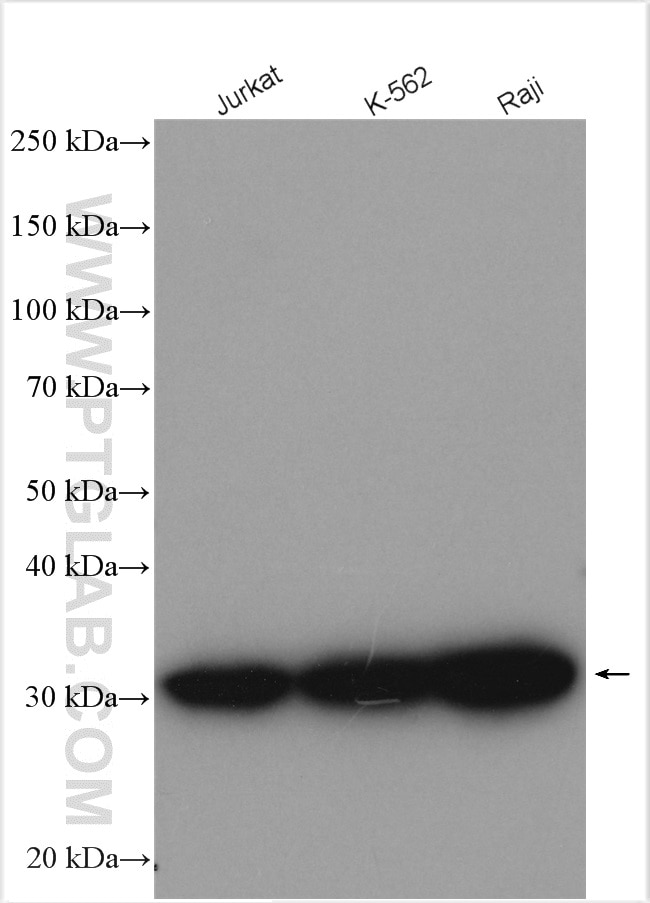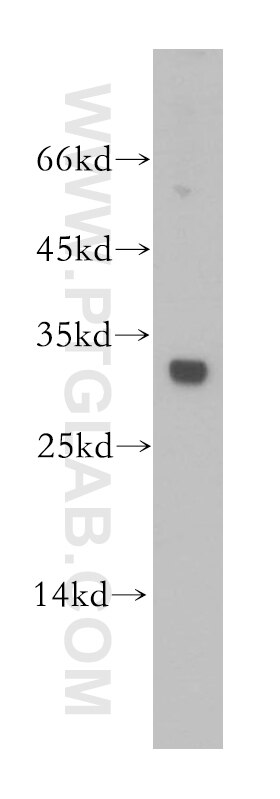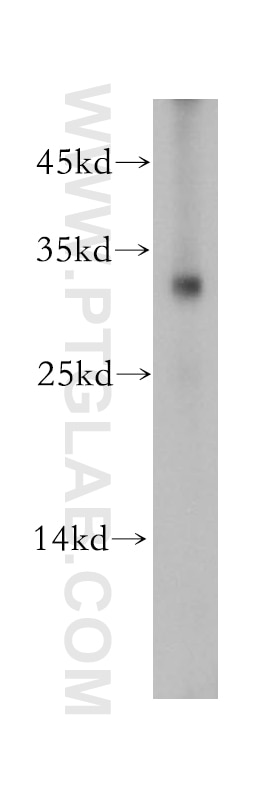Anticorps Polyclonal de lapin anti-Nucleoside phosphorylase
Nucleoside phosphorylase Polyclonal Antibody for WB, ELISA
Hôte / Isotype
Lapin / IgG
Réactivité testée
Humain, rat, souris et plus (1)
Applications
WB, IF, ELISA
Conjugaison
Non conjugué
N° de cat : 18009-1-AP
Synonymes
Galerie de données de validation
Applications testées
| Résultats positifs en WB | cellules Jurkat, cellules K-562, cellules Raji, cellules U-937 |
Dilution recommandée
| Application | Dilution |
|---|---|
| Western Blot (WB) | WB : 1:1000-1:4000 |
| It is recommended that this reagent should be titrated in each testing system to obtain optimal results. | |
| Sample-dependent, check data in validation data gallery | |
Applications publiées
| WB | See 5 publications below |
| IF | See 1 publications below |
Informations sur le produit
18009-1-AP cible Nucleoside phosphorylase dans les applications de WB, IF, ELISA et montre une réactivité avec des échantillons Humain, rat, souris
| Réactivité | Humain, rat, souris |
| Réactivité citée | rat, canin, Humain, souris |
| Hôte / Isotype | Lapin / IgG |
| Clonalité | Polyclonal |
| Type | Anticorps |
| Immunogène | Nucleoside phosphorylase Protéine recombinante Ag12507 |
| Nom complet | nucleoside phosphorylase |
| Masse moléculaire calculée | 289 aa, 32 kDa |
| Poids moléculaire observé | 32 kDa |
| Numéro d’acquisition GenBank | BC106074 |
| Symbole du gène | Purine nucleoside phosphorylase |
| Identification du gène (NCBI) | 4860 |
| Conjugaison | Non conjugué |
| Forme | Liquide |
| Méthode de purification | Purification par affinité contre l'antigène |
| Tampon de stockage | PBS with 0.02% sodium azide and 50% glycerol |
| Conditions de stockage | Stocker à -20°C. Stable pendant un an après l'expédition. L'aliquotage n'est pas nécessaire pour le stockage à -20oC Les 20ul contiennent 0,1% de BSA. |
Informations générales
Purine nucleoside phosphorylases (PNP) is a ubiquitous enzyme of purine metabolism that functions in the salvage pathway, including even those of protozoan parasites, thus enabling the cells to utilize purine bases recovered from metabolized purine ribo- and deoxyribonucleosides to synthesize purine nucleotides (PMID: 11337031, 23332162). PNP deficiency in humans leads to an impairment of T-cell function, usually with no apparent effects on B-cell function. hPNP is widely distributed in various tissues and cells of the human body, with the highest activity in kidney, peripheral lymphocytes and granulocytes (PMID: 38701712).
Protocole
| Product Specific Protocols | |
|---|---|
| WB protocol for Nucleoside phosphorylase antibody 18009-1-AP | Download protocol |
| Standard Protocols | |
|---|---|
| Click here to view our Standard Protocols |
Publications
| Species | Application | Title |
|---|---|---|
J Hazard Mater Integrative proteomics and metabolomics approach to elucidate metabolic dysfunction induced by silica nanoparticles in hepatocytes. | ||
J Biol Chem Patient-derived organotypic tissue cultures as a platform to evaluate metabolic reprogramming in breast cancer patients | ||
Int Immunopharmacol Spermidine attenuates monocrotaline-induced pulmonary arterial hypertension in rats by inhibiting purine metabolism and polyamine synthesis-associated vascular remodeling | ||
J Ethnopharmacol Diosmetin-7-O-β-D-glucopyranoside from Pogostemonis Herba alleviated SARS-CoV-2-induced pneumonia by reshaping macrophage polarization and limiting viral replication |




